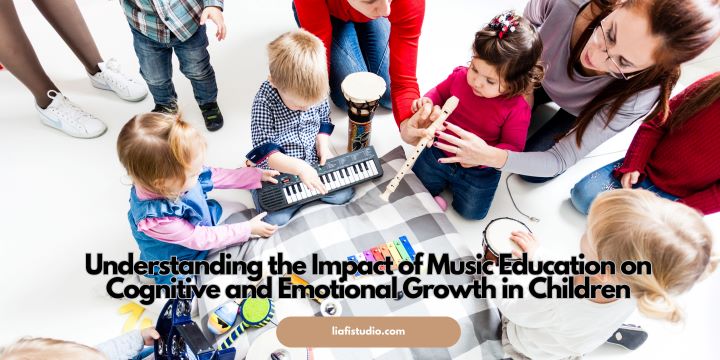Key Takeaways:
- Engagement in music education enhances cognitive abilities like memory, language development, and mathematical skills in children.
- Social interaction and emotional intelligence are fostered through collaborative activities in music education.
- Access to music education should be inclusive, promoting innovation and cross-cultural understanding, instilling creativity and a global perspective in students.
Immersing children in music education does more than introduce them to beats and melodies; it effectively sets a harmonious stage for their cognitive and emotional development. This holistic approach to learning equips young minds with the tools they need for educational and personal growth. Given today’s vast online landscape, countless music resources are available at our fingertips, enriching the learning experience for children across the globe.
Cognitive Benefits of Music Education for Children
One of the key benefits of music education lies in its profound influence on cognitive abilities. Engaging with musical instruments or sheet music requires intense concentration, enhancing a child’s memory retention. Additionally, these activities involve processing diverse sensory inputs concurrently, fostering the development of multitasking skills invaluable in academic and everyday contexts. Access to comprehensive music resources further amplifies these advantages.
The intricate link between music and language is particularly noteworthy. Through learning musical scales and melodies, children inherently practice recognizing patterns and sequences that mirror language structure. This rhythmic and melodic practice paves the way for more profound language comprehension and verbal skills. Additionally, abstract reasoning skills, essential for understanding complex mathematical principles, are often developed through mastering timing and recognizing musical patterns. The depth of this connection is marvelously captured in research highlighted by ScienceDaily, emphasizing how musical training can significantly boost reading and writing skills.
Social and Emotional Advantages of Learning Music
The social environment of music education programs also contributes positively to a child’s emotional intelligence. Children who participate in band or choir hone their musical abilities and learn to function within a group. This educational setting fosters a community where children can practice social skills, negotiate with peers, and develop a sense of belonging—all critical factors for their emotional health. As they navigate the complexities of teamwork, they understand the intricacies of individual and group dynamics, enhancing their capabilities to form and maintain relationships.
Similarly, the emotional benefits of expressing oneself through music are profound. Performing a musical piece in front of an audience is a daunting yet rewarding experience—children learn to manage stage fright and harness their emotions for artistic expression. These experiences in self-expression and the joy of sharing their musical accomplishments with others contribute significantly to a child’s self-concept. In the process, they develop as musicians and individuals with a well-rounded emotional palette.
Music Education and Its Role in Creativity and Innovation
Creativity is a highly esteemed talent in modern society and is exemplified strongly in the practice of music. Students are regularly challenged to interpret musical pieces individually through learning and playing music, fostering creative thinking and original output. This process of creative engagement is critical to developing the innovative mindset that many modern industries and professions value. Children learn early on that there is not always one correct answer but multiple solutions and interpretations, training them to become flexible thinkers and problem-solvers.
Furthermore, the study of music encourages experimentation and exploration. From improvising during a jazz solo to composing an original song, the possibilities for inventiveness are limitless. Allowing children this freedom to create new sounds and patterns enriches their musical prowess but also helps solidify their confidence in their creative abilities to transform their ideas into reality.
The Role of Music in Cross-Cultural Understanding and Global Awareness
Music education serves as a cultural bridge, offering insights into the expressions and practices of people from different walks of life. Music’s global reach allows a unique view into the mores of diverse cultures, promoting understanding and empathy among students. By exploring international music genres—from African drumming to European classical—, students begin to appreciate the common emotions that all humans share, irrespective of language or geography. Through this educational lens, learners are prepared to interact more informally and compassionately with the world.
As students delve into various music traditions, they gain respect for other cultures and learn to celebrate the rich tapestry of human expression. Music becomes a medium through which they can connect with people worldwide, fostering a sense of global community and mutual appreciation. The resultant global awareness is an essential component of education, equipping children to thrive in increasingly interconnected societies.
Accessibility and Inclusivity in Music Education
Despite its far-reaching benefits, not all children can receive music education. Economic, geographic, and resource inequalities often hinder access to quality music programs. To address this issue, the educational community must prioritize inclusivity, ensuring every child from any background can partake in these enriching activities. Technological advances have made music more accessible than ever—it’s now possible to learn an instrument online, access digital sheet music, and even collaborate with others in virtual ensembles. This digital democratization of music education is vital to leveling the playing field for all students.
Yet, much remains to be done to ensure every child can reap the developmental benefits of music education. Innovative approaches to teaching music, such as using apps that gamify learning or platforms that enable remote instruction, can make music education more inclusive and engaging. Incorporating universal design principles to account for different learning styles and abilities is beneficial for students and a moral imperative that can transform lives.
Music Education at Home and in the Classroom
Fostering musical interests can be done without grand instruments or professional expertise. Parents and educators can creatively weave music into the fabric of everyday education. Incorporating tunes during storytime, encouraging children to create their musical instruments from household items, or simply singing and moving to rhythmical patterns—these simple acts bring joy and enhance learning experiences in any home or educational setting.
The benefits of such integrated approaches are multifold, as they open the doors to musical exploration while reinforcing concepts from other curricular subjects. Mathematics, for example, can be taught through rhythm counting and pattern recognition, while lessons in culture and history may include exploring the origins of different music genres. Such practical applications bridge the gap between abstract theory and tangible expertise, instilling a natural and lifelong love for music.
Overcoming the Challenges in Implementing Music Programs
The most pervasive challenge that music educators face today is funding. Budget cuts and prioritizing other subjects often lead to music education being sidelined. Investing in a comprehensive music program requires financial resources and a community and administrative buy-in. Despite the hurdles, the advocacy for music education gains momentum when armed with empirically supported benefits. The conversation around music in schools can be significantly advanced with factual evidence, such as that found in the comprehensive piece by NAfME, which details advocating the value of music education.
Studying the Long-term Effects of Music Education
Music education’s influence stretches far beyond childhood and adolescence. Alums of comprehensive music programs frequently credit their successes—personal and professional—to the discipline, teamwork, and creative thinking cultivated during their early musical training. Studies have shown that the benefits of early musical experiences can last a lifetime, leading to higher achievements in both the arts and sciences. Music education isn’t just creating musicians; it’s crafting future leaders, innovators, and critical thinkers.
How Policy Makers Can Support Music Education
Music education has often been viewed as an optional add-on rather than an essential part of a child’s curriculum. Yet, as research and practice show, music education can significantly enhance the learning experience. Policymakers play a pivotal role in embedding music education within school programs. By recognizing the far-reaching impact of music education, initiatives, and policies can be implemented to secure funding, resources, and support for music programs. This institutional backing is essential for giving educators the tools they need to shape the next generation of learners, artists, and global citizens.








